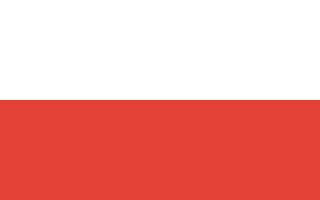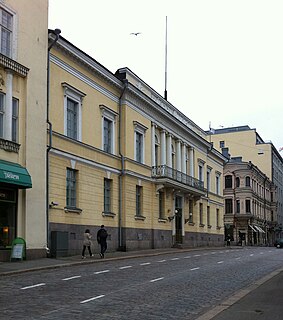
The Second Polish Republic, commonly known as interwar Poland, refers to the country of Poland in the period between the First and Second World Wars (1918–1939). Officially known as the Republic of Poland, sometimes Commonwealth of Poland, the Polish state was re-established in 1918, in the aftermath of World War I. When, after several regional conflicts, the borders of the state were fixed in 1922, Poland's neighbours were Czechoslovakia, Germany, the Free City of Danzig, Lithuania, Latvia, Romania and the Soviet Union. It had access to the Baltic Sea via a short strip of coastline either side of the city of Gdynia. Between March and August 1939, Poland also shared a border with the then-Hungarian governorate of Subcarpathia. The Second Republic ceased to exist in 1939, when Poland was invaded by Nazi Germany, the Soviet Union and the Slovak Republic, marking the beginning of the European theatre of World War II.

Poland, officially the Republic of Poland, is a country located in Central Europe. It is divided into 16 administrative subdivisions, covering an area of 312,696 square kilometres (120,733 sq mi), and has a largely temperate seasonal climate. With a population of approximately 38.5 million people, Poland is the sixth most populous member state of the European Union. Poland's capital and largest metropolis is Warsaw. Other major cities include Kraków, Łódź, Wrocław, Poznań, Gdańsk, and Szczecin.

A województwo is the highest-level administrative subdivision of Poland, corresponding to a "province" in many other countries. The term "województwo" has been in use since the 14th century, and is commonly translated in English as "province". Województwo is also rendered in English by "voivodeship" or a variant spelling.

Rybnik(listen) is a city in southwestern Poland, in the Silesian Voivodeship. The city first developed as a fishing centre in the Middle Ages, then was a capital of so-called Rybnik State. Rybnik grew as an important centre of coal mining and the seat of the surrounding county in the 19th century. Under Poland's communist rule from 1945-1989 the city was projected to grow as a main mining centre of southern Poland.

The Poles, commonly referred to as the Polish people, are a nation and West Slavic ethnic group native to Poland in Central Europe who share a common ancestry, culture, history, and are native speakers of the Polish language. The population of self-declared Poles in Poland is estimated at 37,394,000 out of an overall population of 38,538,000, of whom 36,522,000 declared Polish alone.

The Invasion of Poland, known in Poland as the September Campaign or the 1939 Defensive War, and in Germany as the Poland Campaign (Polenfeldzug), was an invasion of Poland by Germany that marked the beginning of World War II. The German invasion began on 1 September 1939, one week after the signing of the Molotov–Ribbentrop Pact between Germany and the Soviet Union. The Soviets invaded Poland on 17 September following the Molotov–Tōgō agreement that terminated the Soviet and Japanese Battles of Khalkhin Gol in the east on 16 September. The campaign ended on 6 October with Germany and the Soviet Union dividing and annexing the whole of Poland under the terms of the German–Soviet Frontier Treaty.

The Polish–Lithuanian Commonwealth – formally, the Crown of the Kingdom of Poland and the Grand Duchy of Lithuania and, after 1791, the Commonwealth of Poland – was a dual state, a bi-confederation of Poland and Lithuania ruled by a common monarch, who was both King of Poland and Grand Duke of Lithuania. It was one of the largest and most populous countries of 16th- to 17th-century Europe. At its largest territorial extent, in the early 17th century, the Commonwealth covered almost 400,000 square miles (1,000,000 km2) and sustained a multi-ethnic population of 11 million.

The Polish–Soviet War was fought by the Second Polish Republic, Ukrainian People's Republic and the proto-Soviet Union over a region comparable to today's westernmost Ukraine and parts of modern Belarus.

The Polish People's Republic was a country in Central Europe that existed from 1947 to 1989, and the predecessor of the modern democratic Republic of Poland. With a population of approximately 37.9 million inhabitants near the end of its existence, it was the most populous state of the Eastern Bloc after the Soviet Union. Having a unitary Marxist–Leninist communist government imposed by the Soviet Union following World War II, it was also one of the main signatories of the Warsaw Pact. The largest city and official capital since 1947 was Warsaw, followed by industrial Łódź and cultural Kraków.

The Poland national football team is the men's football team that has represented Poland in international competitions since its first match in 1921. It is controlled by the Polish Football Association, the governing body for football in Poland.

Jerusalem Avenue is one of the principal streets of the city of Warsaw in Poland. It runs through the City Centre along the East-West axis, linking the western borough of Wola with the bridge on the Vistula River and the borough of Praga on the other side of the river.
Staropolski Okręg Przemysłowy is an industrial region in northern part of Lesser Poland. It is the oldest and in terms of area covered, largest of Polish industrial regions. Most of the region is located in Lesser Poland Upland, and its historic center lies along the Kamienna river. Primary industrial cities: Kielce, Radom, Ostrowiec Świętokrzyski, Starachowice and Skarżysko-Kamienna.
Gmina Oleśnica is a rural gmina in Oleśnica County, Lower Silesian Voivodeship, in south-western Poland. Its seat is the town of Oleśnica, although the town is not part of the territory of the gmina.

Kaartinkaupunki is a neighbourhood in the southern part of Helsinki, Finland.

The 2019 FIFA U-20 World Cup was the 22nd edition of the FIFA U-20 World Cup, the biennial international men's youth football championship contested by the under-20 national teams of the member associations of FIFA, since its inception in 1977 as the FIFA World Youth Championship. The tournament was hosted by Poland between 23 May and 15 June 2019. This was the first FIFA tournament hosted by Poland; the country had hosted UEFA international football events in the past including the UEFA Euro 2012 with Ukraine and the 2017 UEFA European Under-21 Championship.

Solca is an abandoned village within the municipal borders of the Doly District in the town of Karviná in Karviná District, Moravian-Silesian Region, Czech Republic.

The Branicki Residential House - Smolna 40 is an eclectic in style, palace-like building dated back to 1903, located on Smolna Street in Warsaw, Poland. It is today the four-star boutique Hotel Indigo Warsaw - Nowy Świat, a brand of InterContinental Hotels Group.
















